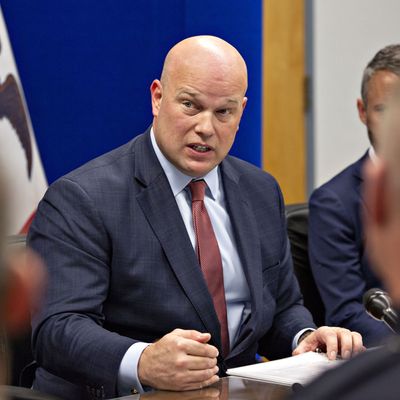
At the second presidential debate, Donald Trump pointed at Hillary Clinton and issued a chilling threat. “If I win,” he warned, “I am going to instruct my Attorney General to get a special prosecutor to look into your situation because there has never been so many lies, so much deception. There has never been anything like it, and we’re going to have a special prosecutor.”
Trump has repeated variations of this threat many times. Like “Build the wall,” “Lock her up” is a core foundation of Trump’s platform. It has been treated differently, though — less literally, and more metaphorically, like a generalized mantra reminding MAGA-world that Trump’s enemies are evil and deserve to be banished. But a series of recent reports has made it clear that Trump intends this threat in the most literal sense.
Last night, the New York Times reported that Trump repeatedly directed his White House counsel, Don McGahn, to order the Department of Justice to investigate Clinton along with James Comey. The story presented the request as a dead end, put off by McGahn’s strategy of delay and trying to talk Trump out of a dangerous escalation. Yet it makes clear that McGahn never really extinguished Trump’s desire.
A later version of the story adds a significant new tidbit. Trump “repeatedly pressed Justice Department officials about the status of Clinton-related investigations, including [Matt] Whitaker when he was the chief of staff to Attorney General Jeff Sessions, according to a person with direct knowledge of the conversations.”
This fact changes the cast of the story quite significantly. It suggests that McGahn didn’t really stop Trump’s impulse to sic the Department of Justice on Clinton at all. Instead, Trump simply stopped bringing the request to McGahn after he realized that McGahn wasn’t giving him the answer he wanted. Instead, he began working through Matt Whitaker.
As disturbing as Whitaker’s appointment appeared when it first broke, the picture has grown even darker since. The Washington Post reported last night that, from 2014 through 2017, Whitaker was paid $1.2 million by a right-wing nonprofit to advance pro-Republican legal theories. During the campaign, he frequently attacked Clinton, and after, began attacking Robert Mueller. David Corn has unearthed more details of Whitaker’s interviews during this period, which included calls for prosecuting Clinton.
These views helped propel Whitaker’s meteoric rise, from lawyer for a scam patent firm to chief of staff to the Attorney General (and the White House’s “eyes and ears” in the department) to, finally, Acting Attorney General. And in his position working as chief of staff to Sessions, Whitaker had not only repeated contact with Trump, but — as Murray Waas reported in a little-noticed scoop two weeks ago — advised Trump on how to pressure the department into submitting to his demands that it prosecute Clinton. CNN reports that Trump raised this with Whitaker (and his then-superior, Rod Rosenstein) several times.
All of these communications ought to constitute impeachable offenses. (Indeed, the FBI’s former general counsel points out that President Nixon did similar things, and this was cited in his impeachment referral.) But Nixon’s efforts to corrupt the department appear to be both less extensive and far less successful than Trump’s. After all, Trump has managed not only to open a back channel to the inner workings of a department that is supposed to operate with total independence; he has installed his stooge — a man he has suspiciously denied even knowing, even though they have met more than a dozen times — to run it. What plans have they laid?






























